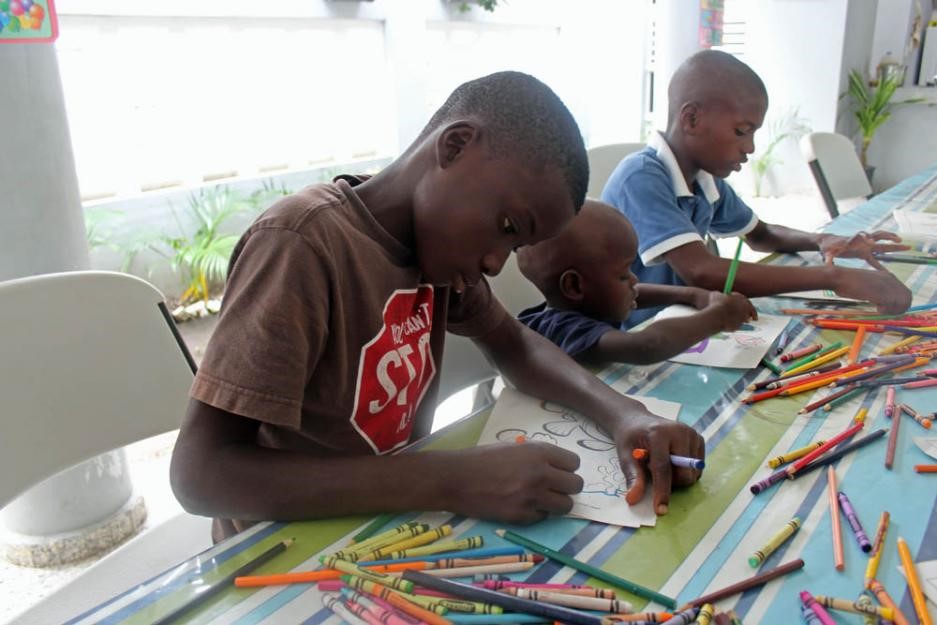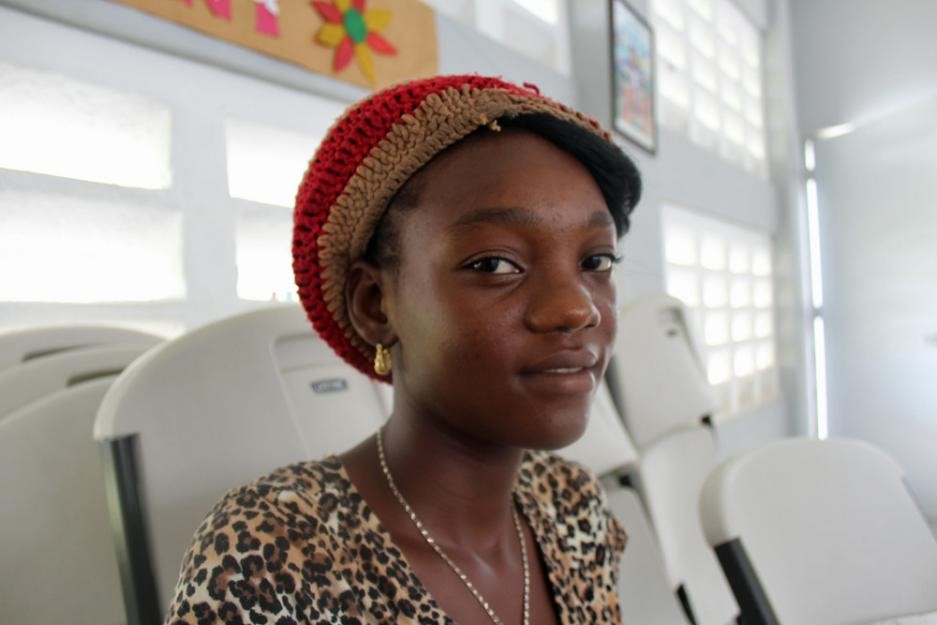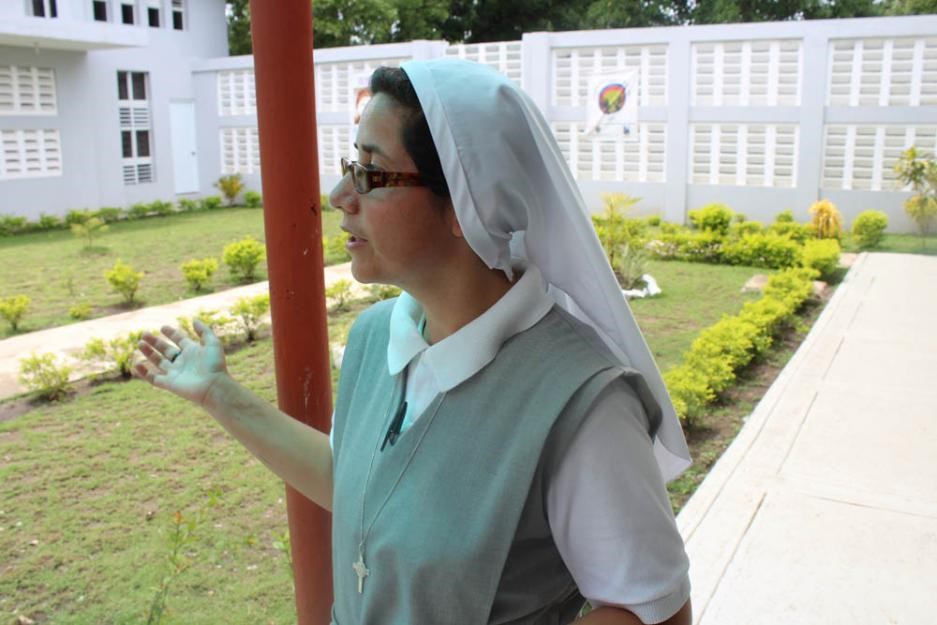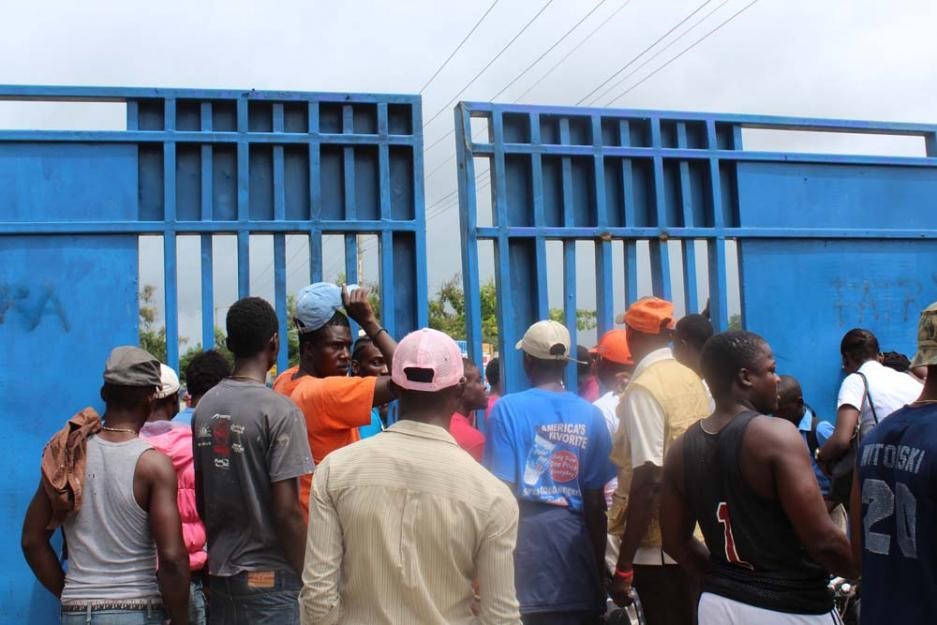
Children at Santa Teresita del Niño Jesús, a church-run shelter for potentially trafficked children and unaccompanied minors trying to cross the Haiti-Dominican Republic border. (GSR photo / Chris Herlinger)
Around the world, you'll find young people in need who are so desperate for opportunities to improve their lives that they'll leave their families and homes behind. And around the world, there are people ready to take advantage of them. Alone or with a friend, consider:
- What factors might influence a person's choice to seek a better life in a new country?
- What might inspire someone to treat another person as something to be used or sold?
Be mindful of similarities and differences between yourself and the girl featured in the story.
- What advantages or safeguards might protect you from the dangers she faces?
- What obligation might you have toward people like her?
Shelter protects Haitian children from trafficking
In September, 15-year-old Prospélanda Aimé tried to cross the border between Haiti and the Dominican Republic with an older woman she said was her aunt.
Prospélanda said the woman thought it would be best if the two of them left Haiti, crossed the border with two cousins, and tried their luck in the neighboring Dominican Republic. There, hundreds of thousands of Haitians live in hopes of a better life.
Their goal was to find work — "commerce," Prospélanda said — possibly selling small convenience items like chewing gum on the street.
Making ends meet was part of what prompted the decision to leave the largely agricultural Artibonite region of western Haiti. But Prospélanda said family problems were also a part of the decision to leave her parents, cross the country and end up at the border in northeast Haiti.
"I really wanted to go," Prospélanda said.
But Prospélanda said the plans went awry: The cousins chose not to go. A Dominican man who was supposed to help them for an undisclosed amount of money was about to take them across the border when police on the Haitian side stopped them, she said.
Prospélanda ended up at Santa Teresita del Niño Jesús, a church-run shelter for potentially trafficked children and unaccompanied minors trying to cross the border. A woman who said she was Prospélanda's aunt later tried to meet her outside the safe house but did not have the needed identification to take her out of the shelter. That posed a worry that perhaps the woman was not actually Prospélanda's aunt, but someone involved in human trafficking.
Prospélanda's story illustrates the dangers of human trafficking and why it is so potent to sisters around the world and others within the Catholic humanitarian networks that work with them.
"It's very, very real, this problem of trafficking," said Michel Edouard Alcimé, deputy director for Jesuit Refugee Service in Ouanaminthe.
He said trafficking in Haiti has to be seen in the context of the country's ongoing economic vulnerabilities that affect Haitians at all levels, but are particularly cruel and exploitative to children.
As it turned out, the woman claiming to be Prospélanda's aunt was a buscone, a person not related to Prospélanda at all, said Sr. Alexandra Bonilla Leonel, a member of the Sisters of St. John the Evangelist, also known as the Juanistas. The Colombian congregation has run a ministry for women and children in Haiti for 22 years and coordinates the operation of the shelter. In 2017, the sisters assisted 500 children in situations of unaccompanied deportation, trafficking and sexual violence, Leonel said.
The sisters eventually contacted Prospélanda's mother, who traveled to Ouanaminthe with the proper documents and took her daughter home.
Leonel said the dangers posed by young people at risk for being trafficked explain why the sisters have to be so strict about identification from those picking up children at the shelter.
"The traffickers will say things to children like, 'Put in your mind that I am your uncle,'" Leonel said.
In addition to underlying confusion about such experiences, there is often a lack of clarity about numbers.
Cornelia Walther, a spokeswoman for UNICEF in Haiti, said "it is difficult to give a number" about children trafficked in Haiti, telling GSR that sisters like the Juanistas are working "at addressing the needs of different categories of unaccompanied children identified at official and unofficial border points. Not all are trafficked."
In 2017, there were 1,109 Haitian children affected by migration or deportations, she said, and 15 percent were "living with adults they are not related to. This does not mean they were trafficked but has led us to further investigate their status. It is important to stress that we are not talking about traffic here. There are few cases that have been qualified as such."
Nonetheless, even the threat of trafficking is worrisome, and Leonel and others who focus on anti-trafficking efforts have other allies, including sisters who do advocacy work at the United Nations, many of whom are making human trafficking a key issue of their efforts.
Leonel praised the U.N.'s attention to the trafficking problem and said her congregation and other congregations in Latin America regularly follow developments at the world body on trafficking and other issues.

In September 2017, 15-year-old Prospelanda Aime tried to cross the border between Haiti and the Dominican Republic with an older woman she said was her aunt. She ended up at Santa Teresita del Niño Jesús, a church-run shelter for potentially trafficked children and unaccompanied minors trying to cross the border. (GSR photo / Chris Herlinger)
The Colombian sister said she believes advocacy at the U.N. can only help their local efforts. Jesuit Refugee Service, Catholic Relief Services, the Caritas humanitarian network and UNICEF also provide support.
"It is very important that the work of the church be made visible," she said.
On Sept. 28, not long after Prospélanda tried to cross the border, the United Nations adopted a declaration reaffirming a global plan of action against human trafficking, a stand needed to "stamp out this abominable practice," said United Nations Secretary-General António Guterres. Among other things, the plan of action, originally adopted in 2010, calls on U.N. member states to take "urgent action to prevent trafficking in persons, protect its victims and prosecute its perpetrators."
The reaffirmation, said Sr. Margaret O'Dwyer of the Company of the Daughters of Charity, strengthened the 2010 U.N. document by calling for "stronger protection and support for victims, especially women and children; addressing trafficking for organ procurement; reducing demand; enhancing prosecutions; and bolstering financial support for anti-trafficking efforts," among other things.
However, O'Dwyer added, "the litmus test of the declaration's effectiveness is not the achievement of a signed document or an approved resolution. It will be in coordinated actions which result in effective reduction of human trafficking combined with vigorous prosecution of the atrocity," she said. "We can't rest until no human being is subjected to this horrendous crime."
Sr. Winifred Doherty, who represents the Congregation of Our Lady of Charity of the Good Shepherd and who spoke during the U.N. meetings in September, noted that "women, girls and children are disproportionately affected" in human trafficking, and many are sexually exploited. She urged the United Nations to examine the underlying causes of trafficking.
"An exploitative, consumerist economy is the antithesis of human rights and human dignity," she said.

Sr. Alexandra Bonilla Leonel. She is a member of the Sisters of St. John the Evangelist, also known as the Juanistas, a Colombian congregation that has run a ministry for women and children in Haiti for 22 years and coordinates the operation of a shelter for children in Ouanaminthe, Haiti. (GSR photo / Chris Herlinger)
Mercy Sr. Angela Reed, who coordinates the work of Mercy Global Action at the U.N., spoke of the concerns both O'Dwyer and Doherty raised. Reed praised the world body for its action but noted that a "human rights-based approach" toward human trafficking is not necessarily popular among U.N. member states because "nation-states have to take responsibility" for taking action to prevent trafficking.
"If they don't address things like education, child protections [and] employment, [then] individuals will continue to be vulnerable to trafficking," she said.
In its 2017 report on international human trafficking, the U.S. State Department said while Haiti "does not fully meet the minimum standards for the elimination of trafficking," the country "is making significant efforts to do so." The achievements noted in the report included strengthening partnerships between a government anti-trafficking commission and international organizations, as well as increasing investigations and prosecutions of those convicted of trafficking crimes.
Even with this progress, though, girls remain particularly vulnerable. Leonel said Prospélanda's experience of leaving family and school to look for work is all too common.
"In the most peripheral areas of Haiti, children have difficulty accessing schools," Leonel said.
She said in such an environment, teenage girls often become pregnant at an early age, furthering a cycle of poverty that leads them to try to emigrate to the neighboring Dominican Republic. It is more economically prosperous than Haiti. But Creole-speaking Haitians face discrimination in the Spanish-speaking Dominican Republic, and in recent years, the Dominican Republic has been deporting increasing numbers of Haitians.
"There is no life of stability in the Dominican Republic for Haitian migrants," said Alcimé of Jesuit Refugee Services.

People on the Haitian side of the border between Haiti and the Dominican Republic, near Ouanaminthe, Haiti, in northeast Haiti. This entry point is for people to meet friends or family returning to Haiti from the Dominican Republic or for people to pass through the border legally. But many Haitians cross the border elsewhere in hopes of going to the Dominican Republic to find work without legal documentation. (GSR photo / Chris Herlinger)
And life at the border is uncertain, too, since there is no consistent pattern of numbers of deportations.
"It's very unstable. We don't know what will happen day-to-day," Alcimé said of the deportations, which groups like Human Rights Watch say are "arbitrary" and target those who live in deepest poverty.
If the numbers of those deported can fluctuate, so can numbers about trafficking of Haitian children.
The Juanistas' ministries are aware of these dynamics and focus on providing shelter for trafficked women and children. But the program also serves Haitian children who have left the Dominican Republic and are returning to Haiti, as well as Haitian street children who live in and near Ouanaminthe.
In addition to shelter, the sisters provide support that includes "food, clothing, medical attention, psychological support, school support and family support after they are returned to their families," Leonel said.
The congregation also has developed a leadership training program for young adults as well as a vocational program for those interested in pursuing humanitarian work given Haiti's vulnerability to disasters. Natural events such as hurricanes and earthquakes are exacerbated by poverty and the country's fragile infrastructure.
This work fits with the Juanistas' charism, which focuses on the needs of women and children and historically also focused workers' needs, Leonel said.
In Ouanaminthe, the work of the sisters is being done quietly and without much fanfare. Leonel notes that networks of traffickers are common along the border Haiti shares with the Dominican Republic.
"It's all too real, this problem," she said.
It's only too real for young people like Prospélanda, who, before being reunited with her mother, found herself halfway across Haiti, separated from her family, out of school and uncertain what her future would be.
She said she felt abandoned and looked forward to being reunited with her family.
"I have nobody here," she said.
Take a moment to contemplate the photo of Prospélanda and reflect upon her story.
- What factors made her vulnerable to human trafficking?
- Which of these can she control?
- Which of these can you control?
- Identify one way that sisters have made a difference in her life.
Jesus has a special love for children. He encouraged his followers to be humble like children. We read in Matthew's gospel:
At that time the disciples approached Jesus and said, "Who is the greatest in the kingdom of heaven?" He called a child over, placed it in their midst, and said, "Amen, I say to you, unless you turn and become like children, you will not enter the kingdom of heaven. Whoever humbles himself like this child is the greatest in the kingdom of heaven. And whoever receives one child such as this in my name receives me.
"Whoever causes one of these little ones who believe in me to sin, it would be better for him to have a great millstone hung around his neck and to be drowned in the depths of the sea."
- Millstones are heavy stones used to grind wheat and other grains. They weigh hundreds or often thousands of pounds. Why would Jesus suggest such an extreme punishment for people who tempt others to sin?
- Scholars say that Jesus, having told his disciples to become like children, uses "little ones" to refer to his followers as well as insignificant people. How do you think Jesus would respond to victims of human trafficking?
How does a lack of humility, or the disrespect of others, encourage human trafficiking?
Pope Francis consistently and constantly has raised awareness of human trafficking. Here is one of his insights:
"Each year thousands of innocent men, women and children are victims of exploitative labor and sexual abuse, and of organ trafficking, and it seems that we have become so accustomed to this, as to consider it a normal thing. This is deplorable; it is cruel; it is criminal! I wish to remind everyone of the duty to combat this abhorrent plague, a form of modern slavery."
Pope Francis, Angelus, July 30, 2017
The pope uses strong words (deplorable, cruel, criminal, abhorrent) to contrast a word that disturbs him – normal. Has human trafficking become normal to you? How can you avoid become complacent about this reality and its victims?
Feb. 8 is the International Day of Prayer and Awareness Against Human Trafficking and the feast day of St. Josephine Bakhita, a Canossian nun and former slave. The date was chosen at the request of women religious to highlight her life. Visit this website to find out more about the day and make plans to celebrate it with your class or group. Or use the prayer resources any time to be in solidarity with trafficking victims and the sisters who serve them.
Human trafficking often seems distant or hidden, but technology helps raise our awareness. Read more about the work of the Juanistas at their shelter in Haiti and agencies that partner with them, such as Jesuit Refugee Service, Catholic Relief Services, the Caritas humanitarian network and UNICEF. Explore ways you can support these groups and spread awareness of their efforts.
Pray this prayer for the intercession of St. Josephine Bakhita:
St. Josephine Bakhita, you were sold into slavery as a child and endured untold hardship and suffering. Once liberated from your physical enslavement, you found true redemption in your encounter with Christ and his Church.
O St. Bakhita, assist all those who are trapped in a state of slavery; Intercede with God on their behalf so that they will be released from their chains of captivity. Those whom man enslaves, let God set free.
Provide comfort to survivors of slavery and let them look to you as an example of hope and faith. Help all survivors find healing from their wounds. We ask for your prayers and intercessions for those enslaved among us.
Amen.
Tell us what you think about this resource, or give us ideas for other resources you'd like to see, by contacting us at education@globalsistersreport.org
